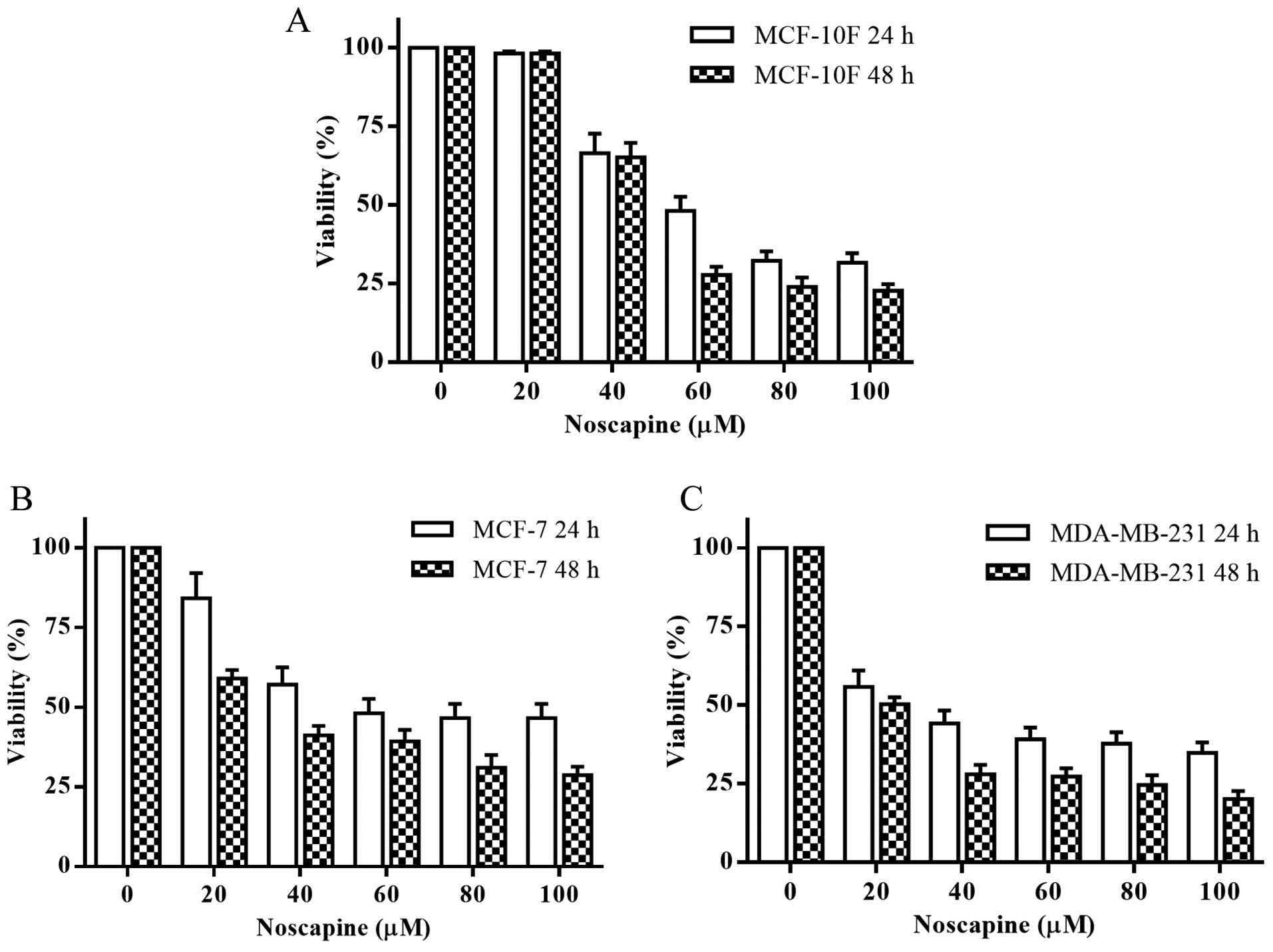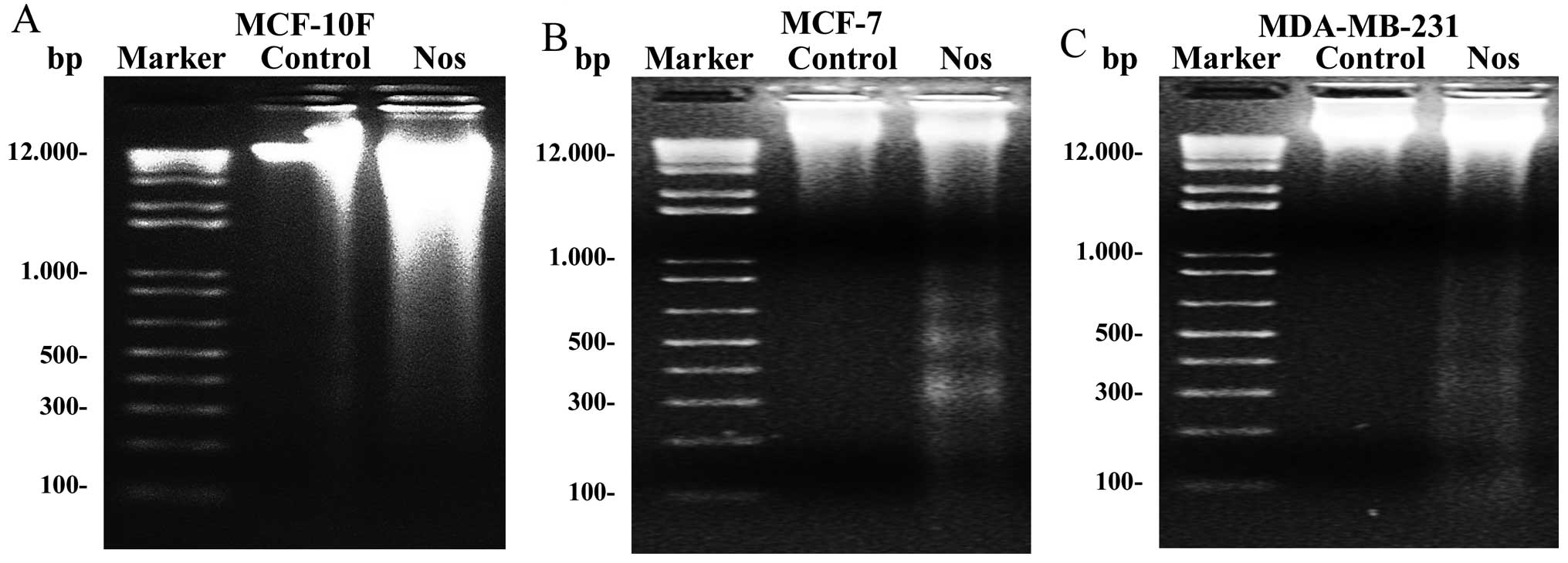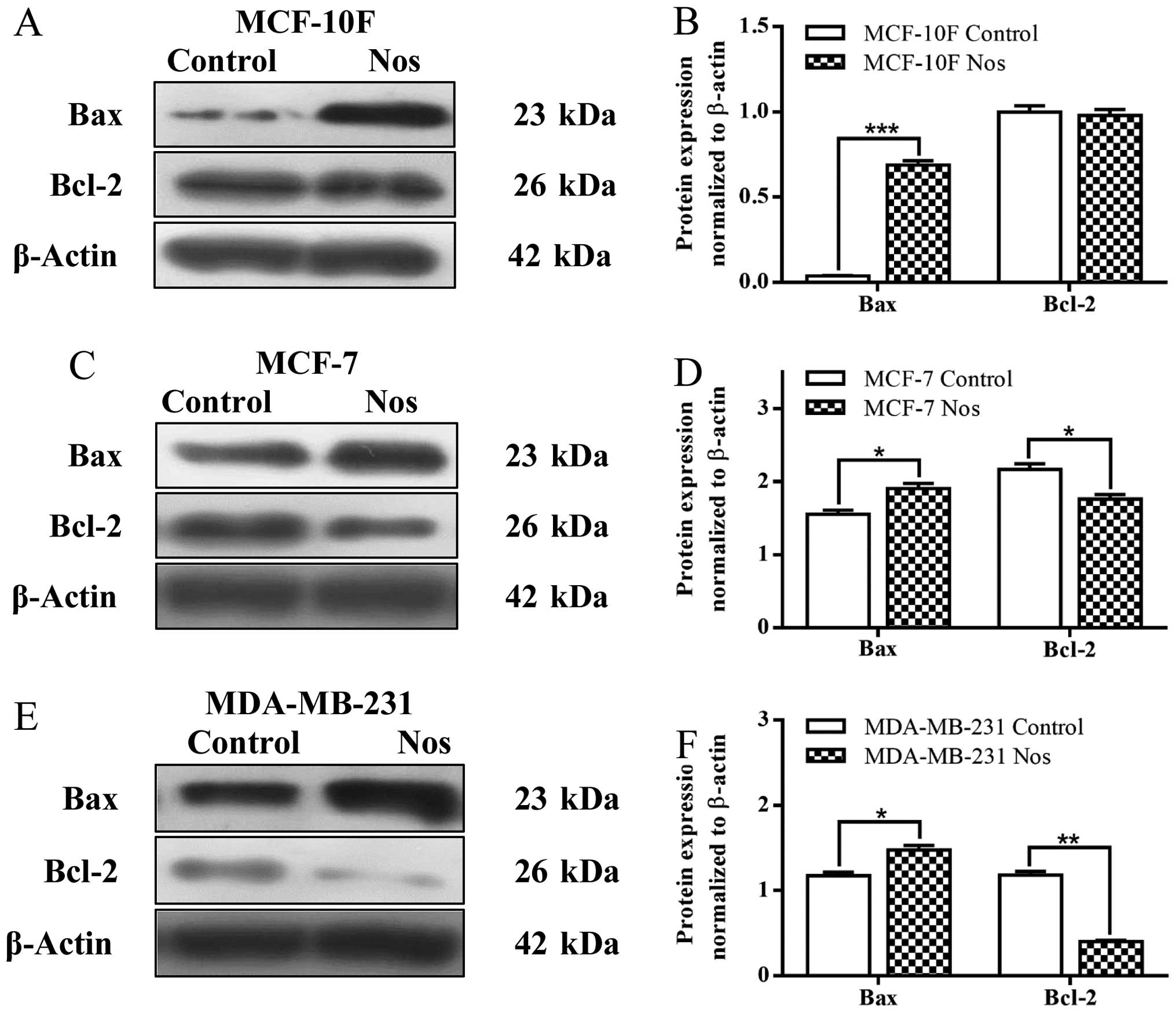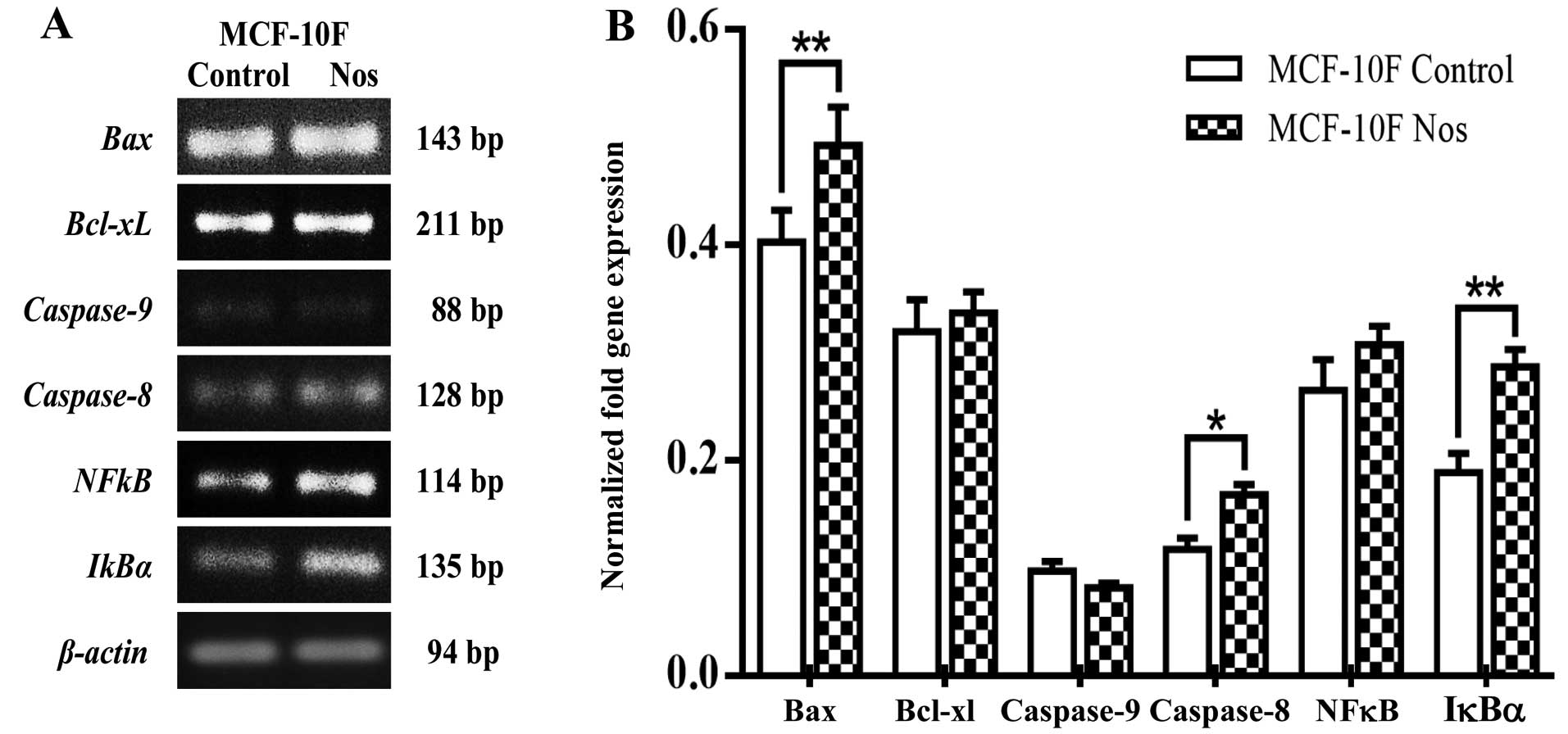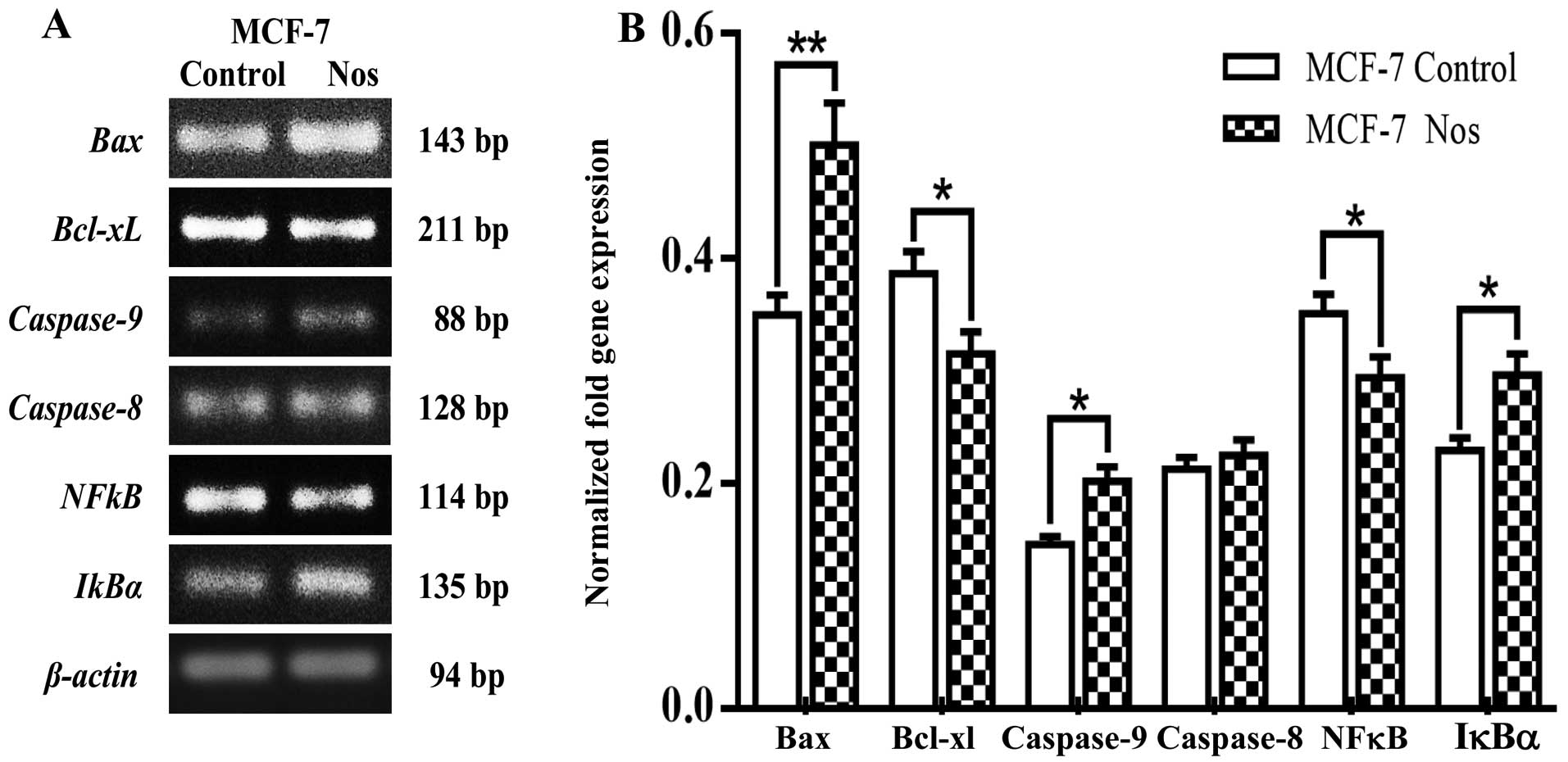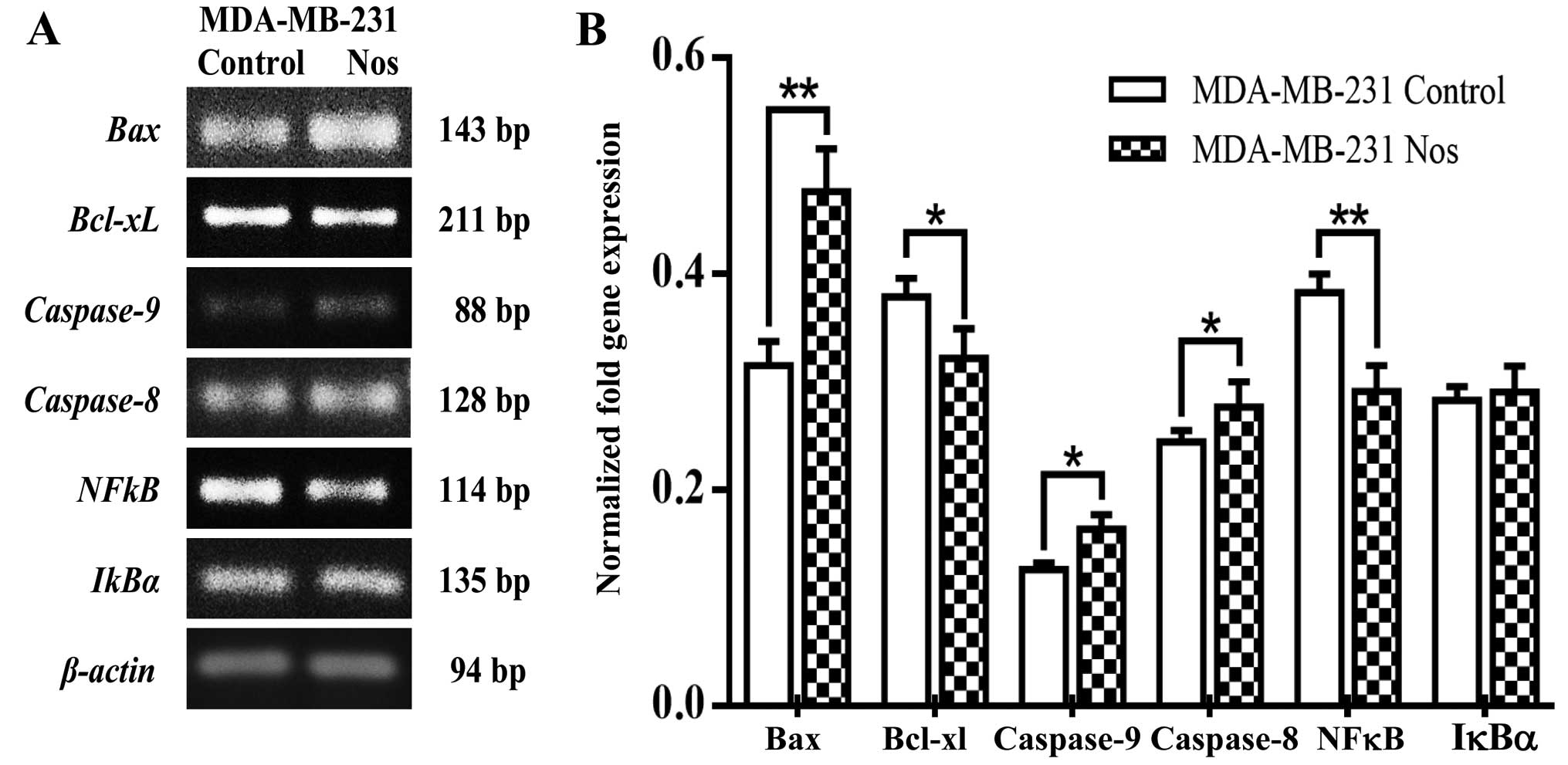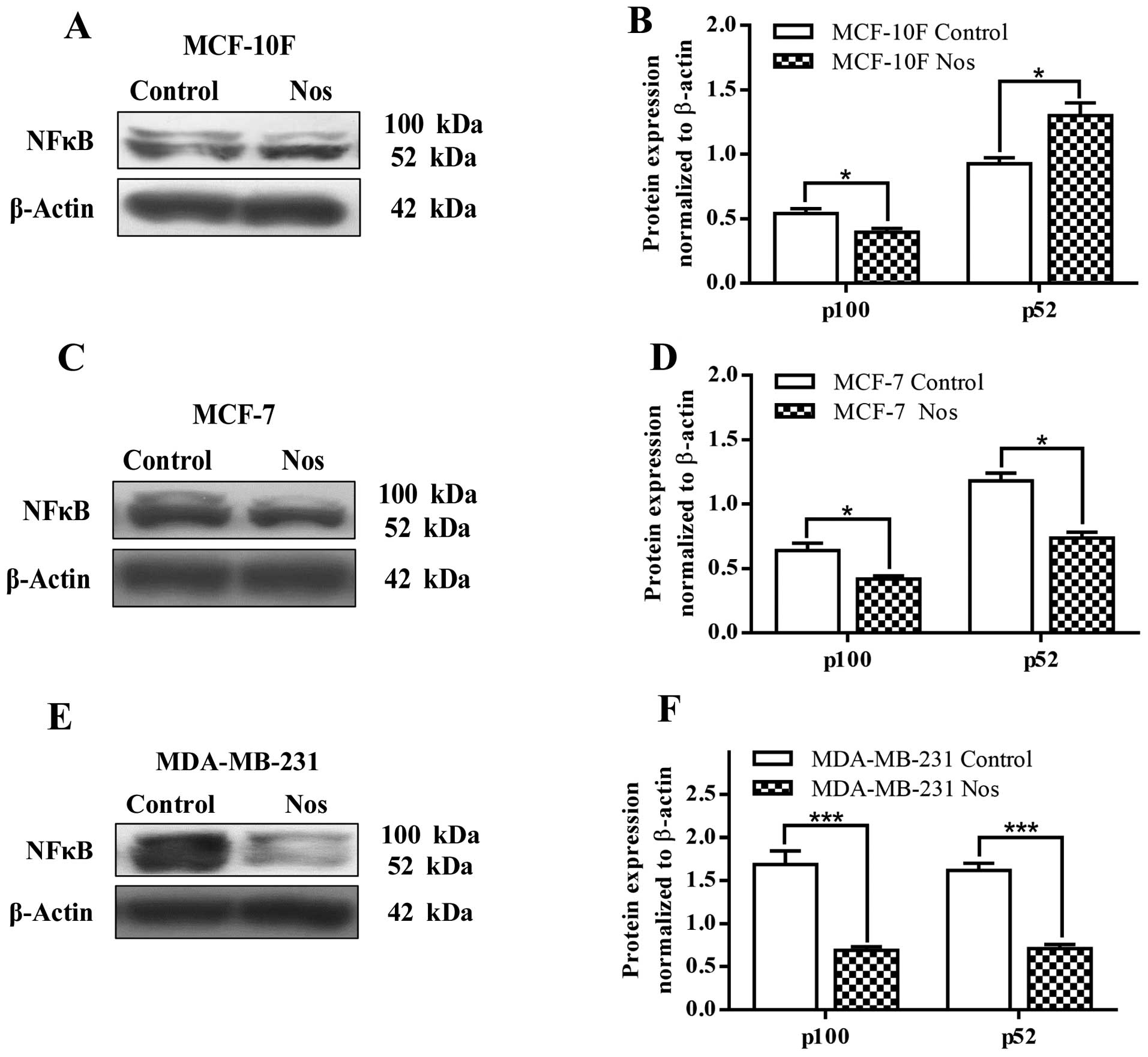|
1
|
Siegel RL, Miller KD and Jemal A: Cancer
statistics, 2015. CA Cancer J Clin. 65:5–29. 2015. View Article : Google Scholar : PubMed/NCBI
|
|
2
|
Torre LA, Bray F, Siegel RL, Ferlay J,
Lortet-Tieulent J and Jemal A: Global cancer statistics, 2012. CA
Cancer J Clin. 65:87–108. 2015. View Article : Google Scholar : PubMed/NCBI
|
|
3
|
Tao Z, Shi A, Lu C, Song T, Zhang Z and
Zhao J: Breast cancer: Epidemiology and etiology. Cell Biochem
Biophys. 72:333–338. 2015. View Article : Google Scholar
|
|
4
|
Cadoo KA, Fornier MN and Morris PG:
Biological subtypes of breast cancer: Current concepts and
implications for recurrence patterns. Q J Nucl Med Mol Imaging.
57:312–321. 2013.PubMed/NCBI
|
|
5
|
Wong RS: Apoptosis in cancer: From
pathogenesis to treatment. J Exp Clin Cancer Res. 30:872011.
View Article : Google Scholar : PubMed/NCBI
|
|
6
|
Sharifi S, Barar J, Hejazi MS and Samadi
N: Doxorubicin changes Bax/Bcl-xL ratio, caspase-8 and 9 in breast
cancer cells. Adv Pharm Bull. 5:351–359. 2015. View Article : Google Scholar : PubMed/NCBI
|
|
7
|
Ravi M, Tentu S, Baskar G, Rohan Prasad S,
Raghavan S, Jayaprakash P, Jeyakanthan J, Rayala SK and Venkatraman
G: Molecular mechanism of anti-cancer activity of phycocyanin in
triple-negative breast cancer cells. BMC Cancer. 15:7682015.
View Article : Google Scholar : PubMed/NCBI
|
|
8
|
Li MX and Dewson G: Mitochondria and
apoptosis: Emerging concepts. F1000Prime Rep. 7:422015.PubMed/NCBI
|
|
9
|
Bargou RC, Daniel PT, Mapara MY, Bommert
K, Wagener C, Kallinich B, Royer HD and Dörken B: Expression of the
bcl-2 gene family in normal and malignant breast tissue: Low
bax-alpha expression in tumor cells correlates with resistance
towards apoptosis. Int J Cancer. 60:854–859. 1995. View Article : Google Scholar : PubMed/NCBI
|
|
10
|
Vela L and Marzo I: Bcl-2 family of
proteins as drug targets for cancer chemotherapy: The long way of
BH3 mimetics from bench to bedside. Curr Opin Pharmacol. 23:74–81.
2015. View Article : Google Scholar : PubMed/NCBI
|
|
11
|
Besbes S, Mirshahi M, Pocard M and Billard
C: New dimension in therapeutic targeting of BCL-2 family proteins.
Oncotarget. 6:12862–12871. 2015. View Article : Google Scholar : PubMed/NCBI
|
|
12
|
Bai L and Wang S: Targeting apoptosis
pathways for new cancer therapeutics. Annu Rev Med. 65:139–155.
2014. View Article : Google Scholar
|
|
13
|
Hata AN, Engelman JA and Faber AC: The
BCL2 family: Key mediators of the apoptotic response to targeted
anticancer therapeutics. Cancer Discov. 5:475–487. 2015. View Article : Google Scholar : PubMed/NCBI
|
|
14
|
Hassan M, Watari H, AbuAlmaaty A, Ohba Y
and Sakuragi N: Apoptosis and molecular targeting therapy in
cancer. Biomed Res Int. 2014:1508452014. View Article : Google Scholar : PubMed/NCBI
|
|
15
|
Cao Y and Karin M: NF-kappaB in mammary
gland development and breast cancer. J Mammary Gland Biol
Neoplasia. 8:215–223. 2003. View Article : Google Scholar : PubMed/NCBI
|
|
16
|
Khan S, Lopez-Dee Z, Kumar R and Ling J:
Activation of NF-κB is a novel mechanism of pro-survival activity
of glucocorticoids in breast cancer cells. Cancer Lett. 337:90–95.
2013. View Article : Google Scholar : PubMed/NCBI
|
|
17
|
Wang W, Nag SA and Zhang R: Targeting the
NF-κB signaling pathways for breast cancer prevention and therapy.
Curr Med Chem. 22:264–289. 2015. View Article : Google Scholar
|
|
18
|
Ye K, Ke Y, Keshava N, Shanks J, Kapp JA,
Tekmal RR, Petros J and Joshi HC: Opium alkaloid noscapine is an
antitumor agent that arrests metaphase and induces apoptosis in
dividing cells. Proc Natl Acad Sci USA. 95:1601–1606. 1998.
View Article : Google Scholar : PubMed/NCBI
|
|
19
|
Mahmoudian M and Rahimi-Moghaddam P: The
anti-cancer activity of noscapine: A review. Recent Patents
Anticancer Drug Discov. 4:92–97. 2009. View Article : Google Scholar
|
|
20
|
Li S, He J, Li S, Cao G, Tang S, Tong Q
and Joshi HC: Noscapine induced apoptosis via downregulation of
survivin in human neuroblastoma cells having wild type or null p53.
PLoS One. 7:e400762012. View Article : Google Scholar : PubMed/NCBI
|
|
21
|
Aneja R, Vangapandu SN, Lopus M,
Viswesarappa VG, Dhiman N, Verma A, Chandra R, Panda D and Joshi
HC: Synthesis of micro-tubule-interfering halogenated noscapine
analogs that perturb mitosis in cancer cells followed by cell
death. Biochem Pharmacol. 72:415–426. 2006. View Article : Google Scholar : PubMed/NCBI
|
|
22
|
Chougule MB, Patel AR, Jackson T and Singh
M: Antitumor activity of Noscapine in combination with Doxorubicin
in triple negative breast cancer. PLoS One. 6:e177332011.
View Article : Google Scholar : PubMed/NCBI
|
|
23
|
Yang ZR, Liu M, Peng XL, Lei XF, Zhang JX
and Dong WG: Noscapine induces mitochondria-mediated apoptosis in
human colon cancer cells in vivo and in vitro. Biochem Biophys Res
Commun. 421:627–633. 2012. View Article : Google Scholar : PubMed/NCBI
|
|
24
|
Afzali M, Ghaeli P, Khanavi M, Parsa M,
Montazeri H, Ghahremani MH and Ostad SN: Non-addictive opium
alkaloids selectively induce apoptosis in cancer cells compared to
normal cells. Daru. 23:162015. View Article : Google Scholar : PubMed/NCBI
|
|
25
|
Liu M, Luo XJ, Liao F, Lei XF and Dong WG:
Noscapine induces mitochondria-mediated apoptosis in gastric cancer
cells in vitro and in vivo. Cancer Chemother Pharmacol. 67:605–612.
2011. View Article : Google Scholar
|
|
26
|
Chougule M, Patel AR, Sachdeva P, Jackson
T and Singh M: Anticancer activity of Noscapine, an opioid alkaloid
in combination with cisplatin in human non-small cell lung cancer.
Lung Cancer. 71:271–282. 2011. View Article : Google Scholar :
|
|
27
|
Heidari N, Goliaei B, Moghaddam PR,
Rahbar-Roshandel N and Mahmoudian M: Apoptotic pathway induced by
noscapine in human myelogenous leukemic cells. Anticancer Drugs.
18:1139–1147. 2007. View Article : Google Scholar : PubMed/NCBI
|
|
28
|
Gonçalves A, Braguer D, Carles G, André N,
Prevôt C and Briand C: Caspase-8 activation independent of
CD95/CD95-L interaction during paclitaxel-induced apoptosis in
human colon cancer cells (HT29-D4). Biochem Pharmacol.
60:1579–1584. 2000. View Article : Google Scholar : PubMed/NCBI
|
|
29
|
Barham W, Chen L, Tikhomirov O, Onishko H,
Gleaves L, Stricker TP, Blackwell TS and Yull FE: Aberrant
activation of NF-κB signaling in mammary epithelium leads to
abnormal growth and ductal carcinoma in situ. BMC Cancer.
15:6472015. View Article : Google Scholar
|
|
30
|
Li F, Zhang J, Arfuso F, Chinnathambi A,
Zayed ME, Alharbi SA, Kumar AP, Ahn KS and Sethi G: NF-κB in cancer
therapy. Arch Toxicol. 89:711–731. 2015. View Article : Google Scholar : PubMed/NCBI
|
|
31
|
Sethi G, Ahn KS and Aggarwal BB: Targeting
nuclear factor-kappa B activation pathway by thymoquinone: Role in
suppression of antiapoptotic gene products and enhancement of
apoptosis. Mol Cancer Res. 6:1059–1070. 2008. View Article : Google Scholar : PubMed/NCBI
|
|
32
|
Sung B, Ahn KS and Aggarwal BB: Noscapine,
a benzyliso-quinoline alkaloid, sensitizes leukemic cells to
chemotherapeutic agents and cytokines by modulating the NF-kappaB
signaling pathway. Cancer Res. 70:3259–3268. 2010. View Article : Google Scholar : PubMed/NCBI
|
|
33
|
Cogswell PC, Guttridge DC, Funkhouser WK
and Baldwin AS Jr: Selective activation of NF-kappa B subunits in
human breast cancer: Potential roles for NF-kappa B2/p52 and for
Bcl-3. Oncogene. 19:1123–1131. 2000. View Article : Google Scholar : PubMed/NCBI
|
|
34
|
Wertz IE: TNFR1-activated NF-κB signal
transduction: Regulation by the ubiquitin/proteasome system. Curr
Opin Chem Biol. 23:71–77. 2014. View Article : Google Scholar : PubMed/NCBI
|















